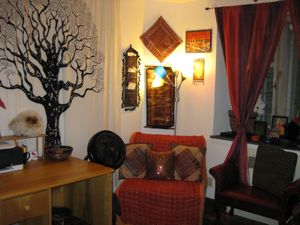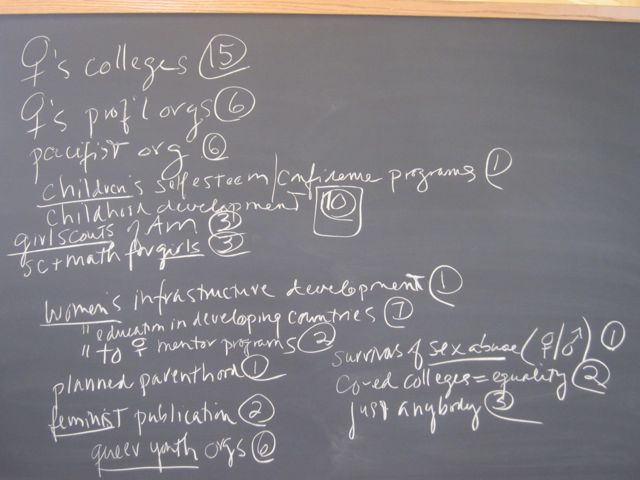Serendip is an independent site partnering with faculty at multiple colleges and universities around the world. Happy exploring!
Notes Towards Day 4 (Th, Jan. 26): Invitation to the Outsiders' Society

I. Bringing it home...
From Examining Our History: Inclusion/Exclusion at Bryn Mawr (11/18/05): Joseph Taylor directed in his will that his money be used to erect buildings "for the comfort and advanced education and care of young women, or girls of the higher classes of society."

Cf. the vision of a woman's college in Three Guineas:
"the aim of the new college ... should be not to segregate and specialize, but to combine. It should explore the ways in which mind and body can be made to co-operate; discover what new combinations make good wholes in human life. The teachers should be drawn from the good livers as well as from the good thinkers... there would be none of the barriers of wealth and ceremony, of advertisement and competition which now make the old and rich universities such uneasy dwelling-places--cities of strife, cities where this is locked up and that is chained down.
II. coursekeeping
sign-in
review sign-up sheet for writing conferences (please tell me when you have arrived:
think about those before/after you, not just your own willingness to wait--and help me
keep on schedule!)
by Sunday night, post on-line your reflections about Woolf's invitation to contribute
three guineas (or related matters....); I invite you to play w/ images, videos, hyperlinks....
your portfolio is self-generating: see /exchange/portfolio/dchin
see also our list of Serendip user names in our password-protected file
by classtime on Tuesday, read Satrapi's first graphic narrative, Persepolis: The Story of a Childhood;
for Thursday, we will her second volume, Persepolis 2 : The Story of a Return (so you might want to keep going....)
think of this as a "letter back to" Virginia Woolf (or a trip forward into the future):
what connections/disconnects do you see between Woolf and Satrapi?
How are their forms of feminism like/different?
(Keynote throughout: the multivocality of the term, varieties of ways of being "feminist.")
To help build that bridge, I've up a link, too, to a short NYTimes article,
"'Sisters' Colleges See a Bounty in the Middle East," which I'd like you to look @ also.
questions?
III. (re)introducing yourself (and Woolf): your name and a description of Three Guineas--
not exactly what your experience was, but what she did to create your experience:
how would you characterize the writing? (how does Woolf write? in what manner?)
did you feel that her letter was addressed to you? (did you belong @ the table she set?)

Arthur's Education Fund describes her "style of speculative-essay writing ... her tricky use of sentences, pushing the images till the period hits, her inventive but personal details ....Because of this lack ... in her education Woolf cannot act as the expert in the text. She instead perfects a kind of straw-horse argument. She does not state, she questions and then answers .... I think it’s quite important to note that Virginia Woolf begings Three Guineas with an apology.... this apology ... really reveals the problems of the question .... It also prepares the reader for the many dead ends that Woolf will lead her audience through. Three Guineas is as much a text that attempts to exhaust the argument as open it ... her argument is somewhat deferred or even buried ... most of her questions are rhetorical, and through them she forces the audience into culpability ....
interesting observation about the relation between form and function....
why make a text hard to read? not "clear"? (discussion in y'day's faculty meeting!)
IV. when we ended class on Tuesday, I was asking you what Woolf's vision has to do w/ --
how much it is a direct critique of--the education you are getting/I am giving @ BMC?
Elizabeth Mosier '84 and Creative Writing instructor,
"Campus Life," Bryn Mawr College Homepage (accessed 4/3/00):
What I felt from the moment I stepped through Pembroke Arch was that Bryn Mawr College was for me.
It was the "room of one's own" that Virginia Woolf had counseled me to find.
sekang posted a link to an essay, "Why We Need Women's Colleges" (by Holyoke's erstwhile/HC's current interim president!)
which said the same thing: "A woman's college ... is the equivalent of Virginia Woolf's "room of one's own," a college of women's own, free of many of the inhibiting presumptions of the male-dominated world."
Our own president speaks frequently and publicly about the value of women's colleges;
her keynote is that they are especially important for training women in the STEM fields:
Bucking the Trend (NYTimes, October 28, 2011)
Closing the Gap (Inside Higher Ed, August 18, 2011)

A "room of one's own" is one thing.
Training women scientists is another.
Three Guineas critiques both, in its analysis of the
socializing force of schooling. Consider Woolf's description
of what women learned before they could go to school, from
"four great teachers of the daughters of educated men --
poverty,
chastity,
derision,
and freedom from unreal loyalties" (p. 78f).
Cf. the call to "pledge yourself not to commit adultery of the brain ... brain prostitution" (pp. 93-94).
Consider the new ceremony Woolf invented:
"What more fitting than to destroy an old word, a vicious and corrupt word that has done much harm in its day and is now obsolete? The word 'feminist"... means "one who champions the rights of women." Since the only right, the right to earn a living, has been won, the word no longer has a meaning. And a word without a meaning is a dead word, a corrupt word. Let us therefore celebrate the occasion by cremating the corpse" (p. 101).
Consider, finally, the invitation to the outsider's society:
"is there not something in the conglomeration of people into societies that releases what is most selfish and violent, least rational and humane in the individuals....? we look upon societies as conspiracies that sink the private brother....you must refuse to join our society in order htat you may make another of your own...the outsiders' Society...to maintain an attitude of complete indifference (pp. 105-7).
.... they would be helped... by their position as outsiders, that freedom from unreal loyalties, that freedom from interested motives.... the limelight paralyses the free action of the human faculties and inhibits the human power to change ...the power to grow can only be preserved by obscurity; and if we wish to help the human mind to create, and to prevent it from scoring the same rut repeatedly, we must do what we can to shroud it in darkness" (113-114).
This is not the vision of "Challenging Women"!
It may not even be the vision of you, alone w/ me in my office, being closed attended to!
In 6 small groups, write a shared
letter back to Woolf, responding to
1) her ceremony to destroy the dead word "feminism"
2) her vision of education into pacifism (that is, away from
"wealth and ceremony, advertisement and competition")
3) her invitation to join the outsider's society.

One person from each group please post your letter.
This a warm up for your (collaboratively written???) web events.....


